Ifso Registry

Download here the 9th IFSO Global Registry Report 2024
We are pleased to present the ninth edition of the IFSO Global Registry Report, offering a concise overview of global activity in Metabolic and Bariatric Surgery for 2023. This is the third edition based solely on aggregated data from national and regional registries, a methodology that safeguards GDPR compliance while ensuring a robust and representative picture of worldwide practice.
In 2023, data were collected on almost 600.000 procedures from 35 countries and two regional registries, representing 89% of all known national registries to IFSO. Participation reached its highest level to date, with twelve new registries joining and five resuming contributions.
This growing and increasingly comprehensive dataset reflects our shared commitment to evidence-based care, equitable access, and continuous improvement of outcomes. The IFSO Global Registry will continue to serve as both a compass and a catalyst for innovation, with the goal of full participation from all known member societies.
On behalf of the IFSO Global Registry Committee,
Ronald Liem
Chair
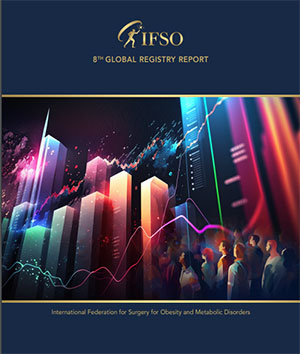
Download here the 8th IFSO 2023 Registry Report
In my role as the current President of the International Federation for the Surgery of Obesity and Metabolic Disorders (IFSO) it is my honor, and as a bariatric surgeon for 30 years, it is my pleasure to introduce the eighth IFSO Global Registry Report 2023.
The data below were collected from 502,150 Metabolic and Bariatric Surgeries (MBS) that were performed in 24 countries and from 2 regional registries representing 81.4% of known registries. During the past year we welcomed new members including Azerbaijan, Iran, and South Korea. Unfortunately, Argentina, Spain, and Taiwan contributed to the 7th but not the 8th Registry. In addition, this was the second report to contain only aggregated information.
The data collected is extremely rich for several reasons. First, it was collected from almost 500,000 patients worldwide. That creates significant subject diversity, so that the collected data are an extremely accurate portrayal of the current practice of MBS. In addition, the volume of collected data increases yearly perpetually increasing the value of the registry. Furthermore, the collected data enables IFSO and others to be able to understand current patterns in the field, for example, the types of procedure being performed, changes in procedure volumes, patient selection, and patient access to care. Lastly, the collected data are invaluable for conducting clinical research which may affect the popularity of the current MBS procedures, reduce the incidence of perioperative adverse events, improve the long term results of surgery, and welcome endoscopic procedures further improving patient access to care.
The value of the Global Registry was demonstrated this past year. Bariatric surgery began in the mid-1950s with the intestinal bypass procedures. However, these procedures were hypoabsorptive procedures and often resulted in severe macronutrient, vitamin and mineral deficiencies as well as other metabolic derangements. The introduction of the gastric bypass in 1967 traded significant nutritional/metabolic complications for anatomic complications such as bleeding, anastomotic leak and venous thromboembolic disease. In addition, there were no guidelines for patient selection, management, or choice of operation. Each surgeon practiced according to their own preferences. Complication rates were high and poor outcomes were not uncommon.
In 1991, the U.S. National Institutes of Health NIH) created a Consensus Conference to review the published data and create criteria for undergoing MBS. While these criteria were beneficial in 1991, they became increasingly out of date, and a means for controlling access for care by the health insurance payers. The 1991 guidelines were still in use, essentially unchanged 30 years later. Although the guidelines did not change, the field changed considerably, including the introduction of laparoscopy and newer, safer procedures.
With no support from the payers, IFSO in partnership with the American Society for Metabolic and Bariatric Surgery (ASMBS) decided to take matters into our own hands. A writing group consisting of bariatric surgeons from both organizations did a deep dive into the currently published literature. The group wrote new criteria for surgery based on the current published data reflecting the introduction of laparoscopy, and the improvements in patient safety, selection, and outcome as well as the adoption of safer procedures like the sleeve gastrectomy, that did not exist in 1991. The criteria created by this group was simultaneously published in both Obesity Surgery and Surgery for Obesity and Related Diseases. These criteria are based on solid data and are slowly becoming accepted around the world. In the United States, several health insurance carriers now use our guidelines for determining access to care. Similar effects are occurring worldwide. There is no doubt that this would not have been possible without the large number of published manuscripts that were based on registry data.
Despite all of the benefits of a registry, there are also some limitations. First, not all national/regional registries have complete data ascertainment; meaning that not every person who undergoes MBS is included in the registry. Secondly, not all registries have complete follow up data from the perioperative period, meaning that important complications may not have been reported and recorded. Thirdly, there were differences in the way each registry audits and confirms that the data that they have is accurate. Lastly, definitions of various reported items vary between registries. This can make comparisons between registries difficult.
The proper collection of data from around the world, categorizing it to allow for interpretation, and the analysis of this data is a major undertaking year in and year out. It is a tremendous amount of work and those who have volunteered to do this work deserve our praise and gratitude.

Professor Scott A. Shikora
President
International Federation for Surgery for Obesity and Metabolic Disorders
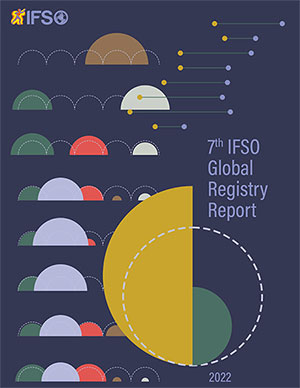
Download here the 7th IFSO 2022 Registry Report
Dear Members,
It is our pleasure to introduce the Seventh IFSO Global Registry Report 2022. This Seventh Report is a summary of aggregated data from 23 national registries and 2 regional registries (Ontario/Canada; Michigan/USA) which included information on 311,441 procedures performed on people with obesity who underwent bariatric metabolic surgery in either 2020 (USA) or 2021 (rest of world) focussed on demographics and activities of bariatric and metabolic surgery.
Our previous reports have been on information collected from operations from contributor countries across 5 chapters. Our Sixth report for example was from data on 507,298 operations from 50 contributor countries and 5 national registries. The big challenge for the IFSO Global Registry has been the utilisation of data provided to compare outcomes between countries which has not been meaningfully due to lack of consistent definitions for data items, inclusion of single centres representing whole countries and meeting the standards with data security regulations.
The General Data Protection Regulation (GDPR) which was enforced in May 2018 required any identifiable or potentially identifiable data be shared with the explicit consent of the provider of the data, in our case, our patients. GDPR also required ethical review of any registry activity. Data must be securely housed and only being used for the purpose it is collected. With such challenges, the IFSO Global Registry proposed that this Seventh IFSO Global Registry Report be a report on aggregated data from established national or regional registries using a data dictionary focusing on demographic and descriptive data only.
Thanks to the persistence efforts by Registry Committee to overcome the challenges and change of direction over the last 12 months led by Wendy Brown (Australia-APC), Ronald Liem (Netherlands-EC), Scott Shikora (USA-NAC), and the leaders of the national registries who have help towards the generation of this report.
It is appropriate to acknowledge also the work of the others in IFSO Registry Committee members (in alphabetical order):
- Salman Al Sabah (MENAC)
- Mehran Anvari (NAC)
- Camilo Boza (LAC)
- Ricardo Cohen (LAC)
- Amir Ghaferi (NAC)
- Jacques Himpens (EC)
- John Morton (NAC)
- Mario Musella (EC)
- Francois Pattou (EC)
- Nasser Sakran (EC)
- Villy Vage (EC)
Each member comes with their unique knowledge and as a leader in their field have contributed enormously to the re-direction of this IFSO project and to help build the IFSO Registry towards to the future. In addition a special thanks to the team at the Australia and New Zealand Bariatric Surgery registry for their assistance in the collation of the data. Our sincerest thank- you to all involved.
It is the goal of the IFSO Global Registry to try to work towards providing the most credible and transparent information available on bariatric and metabolic surgery within our international federation. To achieve this, the IFSO Global Registry will be continuing to work with national and regional registries on collecting good aggregate data focussing on demographics and key facts about the about caseload / penetrance of surgery for metabolic disease and obesity in various countries and real-world data on outcome measures for our patients with adiposity-based chronic diseases.
Hence, we would like to take this opportunity to reach out to all National Presidents and Chapter Presidents to assist in this IFSO Global Registry initiative. We would like to encourage countries that are establishing their bariatric and metabolic programs to set up a national registry and to encourage countries that have registries to aim to cover as many if not all the procedures performed.
By having as many national registries contributing towards the IFSO global registry, IFSO will in return provide the key aspects of quality assurance and global trends that will be essential to guide us in our mission to optimise the control of adiposity-based chronic diseases and to provide us with the tools in our mission to unify the global scientific, surgical and integrated health communities, for the purpose of dissemination of knowledge, collaboration and establishing universal standards of care for the treatment of individuals with adiposity-based chronic disease.
Lilian Kow
IFSO President 2019-2022
Wendy Brown
IFSO Registry Committee Chair
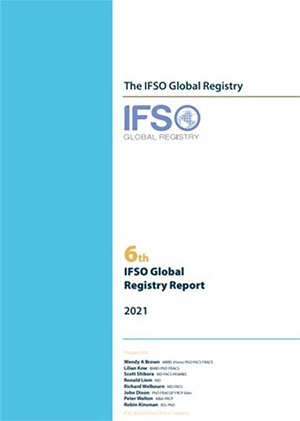
Download here the 6th IFSO 2021 Registry Report
Dear Members,
It is my pleasure - as IFSO President - to introduce the Sixth IFSO Global Registry Report 2021 with data on 507,298 operations from 50 contributor countries with 5 being mature national registries.
There have undoubtedly been challenges relating to the loss of connection and competing priorities that have come with the current COVID-19 global pandemic. Many bariatric units had to divert their resources towards the challenges of the COVID-19 infections in their hospitals and cities. During the waves of the various strains of COVID-19 across different countries and regions, elective surgery had to be abandoned in various forms, and resumed only to be cut back with the next wave.
My congratulations to the Registry Committee for their persistence in overcoming all the unprecedented challenges over the last 2 years, led by Wendy Brown (Australia-APC), Richard Welbourn (UK-EC), John Dixon (Australia-APC), Ronald Liem (Netherlands-EC), Scott Shikora (USA-NAC), the Dendrite Clinical Systems partnership with Peter Walton and Robin Kinsman (United Kingdom).
It is appropriate to acknowledge the work of the other IFSO Registry Committee members
- Salman Al Sabah (MENAC)
- Mehran Anvari (NAC)
- Ricardo Cohen (LAC)
- Amir Ghaferi (NAC)
- Jacques Himpens (EC)
- John Morton (NAC)
- Johan Ottosson (EC)
- Francois Pattou (EC)
- Villy Våge (EC)
It is the goal of the IFSO Global Registry to try to work towards providing the most credible and transparent information available on bariatric and metabolic surgery within our international federation.
To achieve this, the IFSO Global Registry is continuing to work on collecting good descriptive data about caseload / penetrance of surgery for metabolic disease and obesity in various countries and real-world data on outcome measures for our patients with adiposity-based chronic diseases.
I take this opportunity to reach out to all National Presidents and Chapter Presidents to assist in this IFSO Global Registry initiative.
I would like to encourage countries that are establishing their bariatric and metabolic programs to set up a national registry and to encourage countries that have registries to aim to cover as many if not all of the procedures performed.
By having as many national registries contributing towards the IFSO global registry, IFSO will in return provide the key aspects of quality assurance and global trends that will be essential to guide us in our mission to optimise the control of adiposity-based chronic diseases and to provide us with the tools in our mission to unify the global scientific, surgical and integrated health communities, for the purpose of dissemination of knowledge, collaboration and establishing universal standards of care for the treatment of individuals with adiposity-based chronic disease.
For a successful, meaningful Global Registry for the future, the IFSO registry committee members have been working on identifying the core outcome measures that can be reliably defined, measured, provided, and compared internationally by all contributors. This core dataset will be developed through a Delphi process over the coming months. This important core dataset will enable national registries to adapt to and be able to provide the core elements required for the inclusion of as many national datasets as possible.
I look forward to this initiative and the inclusion of many more national registries in our future IFSO Global registry reports.
Lilian Kow
IFSO President 2019-2022
IFSO has worked hard in the last 12 months to ensure we are compliant with GDPR, the laws that govern data in Europe where we are registered as a Society. We have worked with individual contributors to provide them with consent forms for patients, and a framework for ethical approval. We have worked with national societies to understand what barriers exist that could prevent them from sharing data.
By ensuring the groundwork is correct, with reliable and consistent data definitions, data collection and data governance, we hope that the reports in the years ahead will fulfil our important mission.
I would be remiss not to acknowledge the hard work and dedication of all the members of the IFSO Global Registry Committee, the leaders of all the national registries, the team at Dendrite and most importantly our contributors.Without your support, we would not have a report.
The IFSO Global Registry has achieved an enormous amount already. We are now poised to learn from this experience and move forward to provide not only the most accurate data available, but also to support those Societies seeking to start their own registry.
I am very privileged to be a part of the team that is working on this initiative and I look forward to achieving our mission of providing the “most credible and transparent information available on metabolic / bariatric surgery” in the years to come.
Wendy Brown
Chair of the IFSO Registry Committee 2018-2022
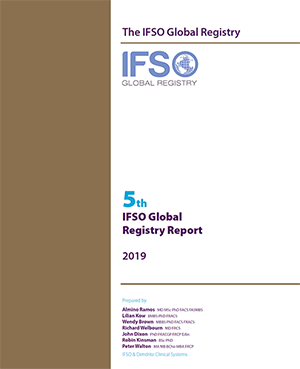
Download here IFSO 2019 Registry Report
PREFACE of Dr. Almino Ramos
As IFSO President, it is my pleasure and privilege to introduce you to the Fifth IFSO Global Registry Report 2019 with data on over 833,000 bariatric / metabolic interventions, coming from 61 different countries. This represents a Herculean effort by the Registry Committee led by Wendy Brown (Australia-APC) and a great team to work with, including Lilian Kow (Australia-APC), Richard Welbourn (UK-EC), John Dixon (Australia-APC), the Dendrite Clinical Systems partnership with Peter Walton and Robin Kinsman, and finally myself.
My first job here is to express IFSO’s gratitude to everyone who has contributed to the Registry and congratulate them for the tremendous job they are doing in favour of bariatric / metabolic surgery in reporting their data. Also we should invite Societies, countries, groups and surgeons that did not participate in this registry project to be prepared to submit data next time. Real and true data is the only way for convincing our peer specialties, governments, insurers, health care companies and the general community about the benefits of bariatric / metabolic surgery. This is part of IFSO’s mission in establishing universal standards of care for the treatment of individuals with chronic adiposity-based disease. At this time it is important to highlight why IFSO has been interested in the Global Registry:
- This is an opportunity to learn and educate using real-world data.
- As IFSO is a cooperation of 5 Chapters this is a good opportunity to better understand the differences and similarities of the different regions in order to develop a global strategy to support our bariatric / metabolic interventions in the fight against obesity / adiposity.
- Understand better the differences of obesity / adiposity as a disease across the world.
- Have a clear vision of the real benefits our procedures can offer in terms of control of comorbidities, weight loss and general improvement of the quality of life.
- Identify what kind of barriers we should overcome in order to consolidate bariatric / metabolic interventions as the procedure of choice for the treatment of severe obesity / adiposity and its related conditions.
- Recognize the different levels of response to our interventions.
- Evaluate the role and results of the different techniques used around the world to try to understand whether or not there are any loco-regional components that influence the quality of the outcomes that patients experience.
- Have adequate material to convince our peers about the great quality of life improvements we can offer via bariatric / metabolic surgery.
- Increase credibility of bariatric / metabolic surgeries by a transparent and trustworthy database.
- And finally the main reason: improve the outcomes offered to our patients.
The Fifth IFSO Global Registry 2019 represents the largest bariatric / metabolic registry ever published. The amount of information we can extract from it is amazing. I’m sure you will find some very interesting surprises.
There is a great deal of variation in terms of demographics and the frequency of obesity-related conditions across the five IFSO Chapters. Outcomes also seem to vary from region to region, and by the choice of surgical technique. You should take a look at the report to draw your own conclusions from the data presented here.
We believe that this Registry initiative is an important part of the IFSO global response to the adiposity epidemic, and we would like to encourage all our members and national societies to actively participate and join us in the next edition. If we don’t make our numbers known, we simply don’t exist!

THE CONTENT OF THIS PAGE IS OPEN ONLY TO IFSO MEMBERS. TO WATCH THE FULL VIDEOS PLEASE LOG IN IN THE MEMBERS' AREA
IF YOU FORGOT YOUR CREDENTIALS TO LOG IN PLEASE CONTACT info@ifso.com
CloseFirst IFSO International Conference on Registries. Lyon, May 2019
IFSO publishes Fourth IFSO Global Registry Report
The Fourth IFSO Global Registry Report (2018) has been released at the XXIII World Congress of the International Federation for the Surgery of Obesity and Metabolic Disorders (IFSO) in Dubai, UAE. Published by Dendrite Clinical Systems, under the auspices of the IFSO, the publication reports data from more than 50 countries on over 394,000 operations including baseline obesity-related disease, operation types, operative outcomes and disease status after bariatric surgery.
Global IFSO Registry Project
The report is the culmination of years of research and analyses from the IFSO Global Registry Project, which was established in January 2014 to demonstrate that it is possible to merge and analyse bariatric and metabolic surgical data from different countries and centres.
“The IFSO Global Registry is by far the best international data registry in metabolic / bariatric surgery available so far. It gives a clear insight in the geographic and cultural differences in metabolic surgery across the globe,” said IFSO President, Professor Jacques Himpens. “The Fourth IFSO Global Registry Report provides an excellent working document for surgeons and other health care professionals, as well as politicians and stakeholders and should allow for better insights in health policies, private and public alike. Hence, it will eventually benefit the universal patient suffering from obesity and its related diseases. And this happens to be congruent with IFSO’s mission.”
This latest report includes 394,431 operation records from 51 countries from five continents, and has detailed information on:
- 165,138 Roux en Y gastric bypass operations (41.9% of all the records submitted)
- 128,417 sleeve gastrectomy procedures (32.6%)
- 47,858 gastric banding operations (12.1%); and
- 19,634 one anastomosis gastric bypass procedures (5.0%)
The publication has some interesting county-to-country analysis and notes a wide variation of BMI pre-surgery between different contributor countries, medians ranging from 34.2kgm2 in South Korea to 49.1kgm2 in Germany. There was also a wide variation in the country-specific gender ratios, ranging from 50.9% female in Georgia to 100% in South Korea.
In addition, Mexico (81.0%), Colombia (79.2%) and Brazil (73.6%) reported the highest proportions of gastric bypass surgery, whereas Australia (100.0%), Saudi Arabia (100.0%) and Guadeloupe (99.5%) reported the highest rates of sleeve gastrectomy operations.
Prior to surgery, 19.8% of patients were on medication for type 2 diabetes (inter-country variation: 4.5-97.7%), 30.6% were treated for hypertension (inter-country variation: 10.9-92.6%), 12.4% of patients were on medication for depression (inter-country variation: 0.0-54.4%), 24.3% of patients required treatment for musculo-skeletal pain (inter-country variation: 0.0-65.1%), 18.6% of patients had sleep apnoea (inter-country variation: 0.0-74.3%) and 17.0% of patients had gastro-oesophageal reflux disorder (inter-country variation: 0.0-54.8%).
Outcomes
Following surgery, the report states that the average percentage weight loss was 30.1% and after primary surgery 62.4% of those taking medication for type 2 diabetes beforehand were no longer on medication one year after surgery. The proportion of patients no longer treated for diabetes was highly dependent on weight loss achieved.
There are 275,834 valid follow up records included in the report and the average percentage weight loss 28.9% one year after surgery, one year after primary surgery 66.1% of those taking medication for type 2 diabetes beforehand were no longer on medication and the proportion of patients no longer treated for diabetes was highly dependent on weight loss achieved.
The report found that there were also significant reductions in the rates of treatment for depression, hypertension and musculo-skeletal pain, as well as a fall in the rates of confirmed sleep apnoea one year after bariatric surgery.
Other highlights of the report show:
- 88.5% of patients who had a gastric band inserted were discharged within one day of their operation
- 84.1% of gastric bypass patients were discharged within two days of surgery
- 84.5% of sleeve gastrectomy patients went home within three days of their operation
- Unsurprisingly, 99.3% of all operations were performed laparoscopically
- The Obesity Surgery Mortality Risk Score 1 (OSMRS) varied widely by country with Georgia, Bulgaria and Hong Kong reporting the highest-risk patient populations (OSMRS groups B & C:78.7%. 72.2% and 66.7% respectively), with South Korea, Bolivia and Kuwait reporting the least risk patient populations (OSMRS groups B & C: 12.5%, 20.5% and22.2% respectively)
“Thank you to all those surgeons who have committed their data for inclusion in this second report, your contribution is very much appreciated. Bariatric surgery has great potential to improve health in a vast number of patients in a cost effective manner; however, it is made available to very few obese people who could benefit from it,” writes Mr Richard Welbourn in the introduction of the report. “The data presented are not intended to be a definitive global representation of bariatric surgery, as data from many countries with large volumes of surgery are not yet included. However, the report is the start of a process that shows what can be achieved within the constituent countries of IFSO. I encourage all key stakeholders in bariatric surgery (especially surgeons, providers and commissioners of care) to embrace this data collection and reporting process at individual clinics and hospitals, and onwards / upwards at both national and international levels.”
“Together with IFSO, we are delighted to publish this fourth report. I would like to thank all the contributors for submitting their data,” said Dr Peter Walton, Managing Director of Dendrite Clinical Systems. “I hope this important publication not only suggests many international research projects that could be undertaken but advances the status and acceptability of bariatric and metabolic surgery worldwide, helping promote an increase in bariatric and metabolic surgery provision.”
The Global IFSO Registry Project was headed by Jacques Himpens (Belgium), Richard Welbourn (UK), Almino Ramos (Brazil), Peter Walton and Robin Kinsman (Dendrite Clinical Systems Ltd, UK).
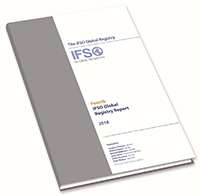
 Download here IFSO 2018 Registry Report
Download here IFSO 2018 Registry Report
Become part of the Global IFSO Registry Project
The International Federation for the Surgery of Obesity and Metabolic Disorders (IFSO) Global Registry Project was established in January 2014 to demonstrate that it is possible to merge and analyse bariatric and metabolic surgical data from different countries and centres. The global initiative will help the bariatric community establish essential benchmark knowledge about the patients, their age and gender distributions, body mass index (BMI) and comorbidity disease burden, as well as track trends in surgery over time.
In August 2017, the Third IFSO Global Registry Report (2017) was released at the XXII IFSO World Congress in London, UK, and included data from more than 40 countries on over 196,000 operations including baseline obesity-related disease, operation types, operative outcomes and disease status after bariatric/metabolic surgery. The report also demonstrated clear and important differences in bariatric practice between countries. To access the latest report, please click here
The ‘Fourth IFSO Global Registry Report,’ will be published at the XXIII IFSO World Congress in Dubai, UAE, and the Federation would like to invite all members to participate in this forthcoming report. All new contributors will be sent an IFSO Global Registry Charter document that will outline and explain:
- The aims of the IFSO Global Registry Project
- Data protection
- Access
- Data ownership
- Publication and other use of the data
- Principles of operation: roles and responsibilities
- Data validation
- Supervising authorities
There are two ways for contributors to submit data – IFSO Upload-My Data portal and IFSO Direct-Data-Entry portal:
- The IFSO Upload-My Data portal enables a community of surgeons or physicians to create a national or international database; even if there are different database systems being used at the local level, the data from each can be integrated into the central, merged registry.
- IFSO Direct-Data-Entry portal allows contributors to directly enter their data onto a secure portal on a case-by-case basis.
“We at IFSO are convinced that one of our prime tasks is to provide global guidelines for safe and effective surgery to the benefit of the patient with adiposity. Critical appraisal of what we do is essential to achieve this goal,” IFSO presiden, Jacques M Himpens. “More than ever we must share our data with the world. More than ever we must contribute to a global and complete registry.”
If you are interested in contributing your data for the ‘Fourth IFSO Global Registry Report’, please email: ifsoregistry@e-dendrite.com for more information.
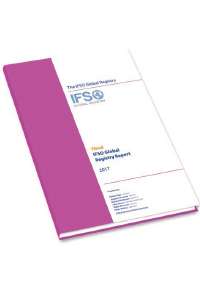
 Download here IFSO 2017 Registry Report
Download here IFSO 2017 Registry Report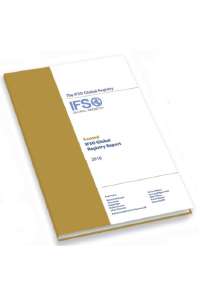
 Download here IFSO 2016 Registry Report
Download here IFSO 2016 Registry Report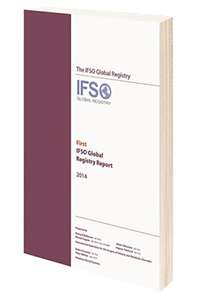
 Download here IFSO 2014 Registry Report
Download here IFSO 2014 Registry Report

